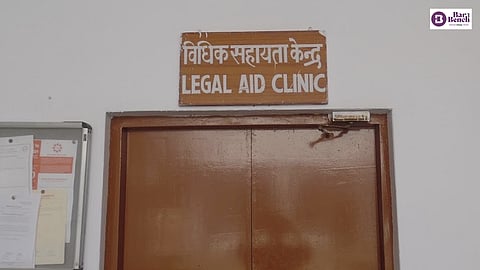
- News
- Columns
- Interviews
- Law Firms
- Apprentice Lawyer
- Legal Jobs
- हिंदी
- ಕನ್ನಡ

The Karnataka High Court on Friday questioned the Karnataka High Court Legal Services Committee (KHLSC) for filing numerous public interest litigations (PIL) petitions.
A Bench of Chief Justice NV Anjaria and Justice KV Aravind said that while they are welcome to file petitions, it could not understand why so many PILs were being filed by the legal aid body.
“Here, in this State (Karnataka), the Legal Services Authority goes on filing public interest litigations? They are welcome to file but sometimes it does not become palatable at least to my comprehension,” the Bench remarked.
Incidentally, the question was posed while hearing a PIL filed by the legal aid body seeking better wages and working conditions for the part time menial daily workers employed at the residences of the judges of the High Court.
The KHLSC is Constitutionally bound to provide free and competent legal services to the weaker sections of the society.
The Court was hearing the 2014 PIL seeking work related benefits for the 71 part time Group D menial workers employed at the judges’ residences at the Dharwad and Kalaburagi benches of the High Court.
The petitioner's counsel told the Court that the PIL had been filed by KHLSC on behalf of the daily workers since they were being paid a mere ₹3,000 per month at the time of filing of the PIL.
They were required to work for four hours a day though the Court had recorded in a January 2016 order that the workers were being made to work all day for an amount of ₹3,000 and ₹3,500 per month, the counsel told the Court.
She further said that after the Court’s intervention, the minimum wages they were being given were brought on par with the permanent Group D employees.
It was also pointed out that two applications were filed in the interim seeking paid and unpaid leaves and in October 2023, the Court had directed the State to see whether any benefits could be extended to them under the Karnataka Daily Wage Employee Welfare Act, 2012.
The petitioner’s counsel also said that the Court had previously noted in its order that the strength of the staff was not adequate and had asked the State to consider creating suitable posts for recruiting additional people.
The counsel for the Registrar General of the High Court also told the Bench that the State government can consider creating posts so that all of them can be regularised.
However, the bench said it might be difficult for the State to extend favours to just one sub-group of workers.
“These are daily workers working for the High Court establishment. They might be a part of a larger group of daily wagers who are employed by the State so it might be difficult for the government to create a sub group and grant them special favours,” the High Court said.
The petitioner pointed out that those who were already deployed cannot be expected to work without even minimum pay.
While State counsel Nilofer Akbar initially sought two weeks to place on record steps taken following the Court’s previous orders, she later opposed the PIL saying if the State grants benefits to the part time Group D workers, “then all the others will also start approaching (the Court).”
The High Court asked the State to consider the prayers of the petitioner and the Court’s previous orders and make its “stand clear” by December 5, the next date of hearing.
[Read Previous Order]